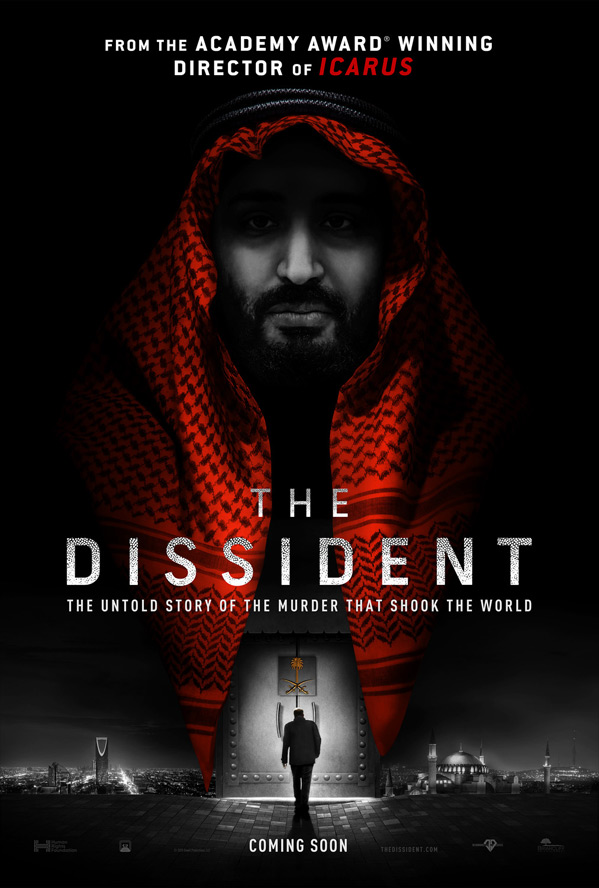Doc Corner: The other Khashoggi film of 2020, 'The Dissident'
 Monday, December 21, 2020 at 11:31AM
Monday, December 21, 2020 at 11:31AM By Glenn Dunks — No column next week as I will be taking a week off for rest and relaxation over the Christmas season.
 Not for the first time this year, the story of Jamal Khashoggi has been told in a documentary that tries—excessively, exhaustively—to be as thrill-a-minute as a Hollywood blockbuster. I wasn’t a fan of it last time and I’m not a fan of it this time, either. Bryan Fogel’s The Dissident is better than that earlier title, Rick Rowley’s Kingdom of Silence; it’s better than his 2018 Oscar winner, Icarus, too, but that isn’t saying much.
Not for the first time this year, the story of Jamal Khashoggi has been told in a documentary that tries—excessively, exhaustively—to be as thrill-a-minute as a Hollywood blockbuster. I wasn’t a fan of it last time and I’m not a fan of it this time, either. Bryan Fogel’s The Dissident is better than that earlier title, Rick Rowley’s Kingdom of Silence; it’s better than his 2018 Oscar winner, Icarus, too, but that isn’t saying much.
What is it about Khashoggi that makes filmmakers think they’re directing an episode of Homeland? Is it simply the key settings of Saudi Arabia and Turkey that inspires such busy and scattered movies?
Whatever it is, if Fogel had just used a tripod and cut half as often he’d have an infinitely better picture.
Instead, what The Dissident is is a story extricated from human emotions. Which, given its subject, is truly startling. Again! Khashoggi was a Saudi national, a journalist and a trusted friend of his homeland’s ruling power. But the shifting dynamics of Saudi Arabia made his disaffection more acute. He moved to Turkey and began writing for The Washington Post, particularly critical of Crown Prince Mohammad Bin Salman’s attitudes towards freedom of press and expression. In 2018, when visiting the Saudi embassy to procure a certificate to marry his partner, he was murdered in horrific, torturous fashion. His body was disposed of in a most gruesome manner and his death covered up by authorities until they couldn’t pretend anymore (at which point they lied, repeatedly, about the cause).

In Fogel’s film, the interesting stuff isn’t really Khashoggi. This film doesn’t try to tell his back story like Kingdom of Silence did, instead focusing more on how he came to be caught walking into the Saudi embassy on CCTV in Turkey on the 2nd of October, 2018 and then promptly vanishing and the days following. If you’ve followed the press around his case then you probably know much of the story; and parts that you do not, well, you may not want to know in all honesty.
It does occasionally land on moments of genuine discovery, notable in its final stretches in a segment about Amazon’s Jeff Bezos (also the owner of The Washington Post, naturally). Likewise, its weaving of the narrative of Twitter in Saudi Arabian throughout—80% of Saudi Arabians use Twitter compared to only 20% of Americans—is fascinating and lends itself to more curious explorations of how the Saudi king uses technology not just for propaganda, but also to target, interfere and intercept his own people. There is also an interesting side-story within The Dissident about another young insurgent and friend of Khashoggi, Omar Abdulaziz, who helped the journalist through secretive means and who lives in constant threat for his own life despite now residing in Canada. It’s a shame that the movie spends so much of its time filming him in ways that call attention to themselves like a spy movie.

Maybe I would be more forgiving of its over-directed tendencies if I hadn’t also seen Kingdom of Silence do the same thing just a few months ago. Maybe. The Dissident is one of those movies (documentary and fiction alike) that considers itself important just because it’s about something important. It shares much in common with Icarus in that sense, just like in how Fogel treats the subject as something to frenetically assemble because people have short attention spans. But even Khashoggi’s fiancée, Hatice Cenzig, barely gets a moment to breathe on camera, to reflect on her partner and the man that he was. There are glimpses of him in there, but the film is not interested in that. I wish The Dissident had slowed down and let us really know the man behind the atrocity.
Release: In cinemas Christmas Day (merry christmas, indeed) before a VOD release on January the 8th.
Oscar chances: Good. They gave the statue to Fogel's last film, Icarus, so they'll pay attention. Certainly a better shot than Kingdom of Silence. While this one may make the finals, I'm not sure about a nomination. It's a very strong year.
 Doc Corner,
Doc Corner,  Review,
Review,  documentaries
documentaries 


Reader Comments (1)
Nice write-up, Glenn. I thought the movie was solid, especially at explaining America's turn-the-other-cheek approach to Saudi Arabia and especially in the way that they explained how the Saudis track individuals digitally, including people who aren't Saudi and have never been there. Frightening stuff.
(Interestingly, social media and its detrimental effects on society seems to be a major theme in the docs this year-- at DOC NYC, The Social Dilemma, The Dissident, and A Thousand Cuts all hit upon the topic, and that's just of the films I saw.)
I, too, could have done with a little less of the spy drama. I kept wondering whether Omar was essential to the story or just good at self-promotion...